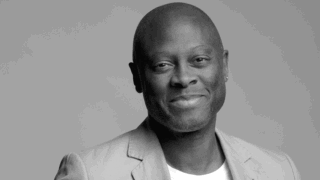The Lavin Agency Speakers Bureau
A speakers bureau that represents the best original thinkers,
writers, and doers for speaking engagements.
A speakers bureau that represents the best original thinkers,
writers, and doers for speaking engagements.
The combination of creativity and technology is what gives humans an edge in the AI era.
John Maeda is a world-renowned artist, graphic designer, computer scientist, educator, and investor whose career reflects his philosophy of humanizing technology. For over two decades, he has worked to integrate technology, education, and the arts into a 21st-century synthesis of creativity and innovation. In his books and on stage, John champions the necessary role that artists and designers play in the new creative economy and the age of AI.
“John Maeda is to design what Warren Buffett is to finance.”—Wired
John Maeda is an American technologist spearheading a new convergence across the design and technology industries. He is the first ever recipient of the White House’s National Design Award for algorithmically-generated visualizations informed by data and AI, and is currently the VP Engineering, CoreAI Computational Design & Research at Microsoft.
In his book How to Speak Machine, John offers a set of simple laws that govern not only the computers of today, but the unimaginable machines of the future. How to Speak Machine provides a coherent framework for today’s product designers, business leaders, and policymakers to grasp the brave new world of algorithm-augmented design. Drawing on his wide-ranging experience from engineering to computer science to design, John shows how businesses and individuals can identify opportunities afforded by technology to make world-changing and inclusive products—while avoiding the pitfalls inherent to the medium.
In his previous role with Automattic, the parent company of WordPress.com, he oversaw design efforts and ensured an inclusive and efficient user experience for all Automattic products. Formerly, he advised dozens of technology businesses as a partner at Kleiner Perkins Caufield & Byers—a world-leading venture capital firm in Silicon Valley. Named as one of the 75 most influential people of the 21st Century by Esquire, John draws on his diverse background as an MIT-trained engineer, award-winning designer, and organization executive to bring people and ideas together. Throughout his career, John has helped executives, inventors and designers push the boundaries of innovation in their fields through his mentorship, live appearances and celebrated books, including The Laws of Simplicity, Creative Code, and Redesigning Leadership. He has appeared as a speaker all over the world, from Davos to Beijing to São Paulo to New York, and his talks for TED.com have received cumulative views of over 2 million to date.
John’s work put KPCB on the map as a leader in business and technology design and demonstrated the economic impact of design in corporations. At the start of 2015, Fast Company named KPCB one of the ten most innovative companies in design—a position fortified by John’s subsequent launching of the “#DesignInTech Report,” which covers venture capital funding and M&A activity for design in the technology industry.
John began his career in Electrical Engineering and Computer Science at MIT and proceeded to integrate formal design training into his technical background. While the web was being built in the 1990s, John led a research team at the MIT Media Lab to connect design with computer science, fostering the first generation of engineers who could elegantly design, and designers who could fluently code. He later became the 16th President of Rhode Island School of Design, where as chief executive he brought technology industry partnerships, lean operations management, and a relentless focus on diversity to help the institution regain its former leading position in the new economy. During his presidency, he received the Tribeca Film Festival’s Disruptive Innovation Award for catalyzing the national movement to transform STEM (science, technology, engineering and math) into STEAM by adding art as a priority area.
John has served on the Board of Directors for wireless hi-fi innovator Sonos and the global advertising firm Wieden+Kennedy. He is also a member of the Technical Advisory Board for Google’s Advanced Technology + Projects Group and the World Economic Forum’s Global Agenda Council on New Growth Models. Most recently he was advisor to John Donahoe, CEO of eBay Inc., where John facilitated the advancement of eBay Inc.’s design culture at scale—that work culminated in a forthcoming Stanford GSB case study.
John received his BS and MS degrees in Electrical Engineering and Computer Science from MIT, with his MS thesis entitled “Concurrent Sparse Matrix Equation Solver for Three-dimensional Semiconductor Simulation.” He earned an MBA from Arizona State University and a PhD from the University of Tsukuba in Japan. He was awarded honorary doctorates in Fine Arts from Maryland Institute College of Art and Simon Fraser University, and was the recipient of the White House’s National Design Award, the Blouin Foundation’s Creative Leadership Award, the AIGA Medal, the Raymond Loewy Foundation Prize, the Mainichi Design Prize, the Tokyo Type Director’s Club Prize, and induction into the Art Director’s Club Hall of Fame. John’s early work for print and the computer was accessioned into the permanent collection of the Museum of Modern Art, and his contemporary art has been showcased in solo exhibitions in Paris, Los Angeles, Tokyo, London, San Francisco, and NYC. John can be found on X discussing technology, business and design at @johnmaeda, one of TIME Magazine’s 140 Best Twitter Feeds, as well as on LinkedIn, where he was named a top U.S. influencer.

Author of The Loop: How A.I. is Creating a World without Choices and How to Fight Back NBC News Technology Correspondent Former Editor-in-Chief of Popular Science Magazine AI Strategic Advisor to Fortune 500 Companies

Founding President, PlusCo Venture Studio Former Chief Creative and Innovation Officer, Cossette

Speaker on AI and Education Executive Director of the Stanford Accelerator for Learning

Author, How Great Ideas Happen Cognitive Scientist at The University of Toronto

Founding President, PlusCo Venture Studio Former Chief Creative and Innovation Officer, Cossette

Founder and Director, MIT Self-Assembly Lab Associate Professor of Design Research, MIT

#1 New York Times Bestselling Author of Grit and Situated | Pioneering Researcher on Grit, Perseverance, and the Science of Success

Nobel Prize Winner | 3rd Most Cited Economist in the World | Bestselling Co-Author of Why Nations Fail and Power and Progress

Harvard Business School Behavioral Science Professor | "40 Under 40 MBA Professor" | Author of TALK: The Science of Conversation and the Art of Being Ourselves

#1 New York Times Bestselling Co-Author of Abundance | Host of thePlain English Podcast | Founder of the Substack Derek Thompson

#1 New York Times Bestselling Author of How the Word Is Passed and Above Ground | The Atlantic Staff Writer

How will American students remain competitive today, tomorrow, fifty years from now? How will they stay on the leading edge of innovation in a hyper-competitive world? Many education initiatives focus on Science, Technology, Engineering, and Math as the path to innovation and a robust economy. But, John Maeda says, these so-called “STEM” subjects will only get us so far. In this passionate, refreshing, and deftly argued talk, John posits that we need to add “Art” to turn “STEM” into “STEAM.” The arts teach us to empathize, to create, to collaborate, and—perhaps most importantly—to humanize. Through a personal exploration of his journey from MIT to the U.S.’s leading art and design college, John argues that critical thinking, critical making, and creative leadership can lead us to an enlightened form of innovation—one where art, design, technology, and business meet. The role of designers and artists is changing and expanding; what we learn from how they work, how they process, and how they think will help drive innovation—the engine of our economy—in the critical years ahead.

With ever more complex technology, instant communication, social media, and big data coming at us, we live in times that beg for simplicity to have meaningful discussions, make better decisions, and have others be genuinely informed. At the MIT Media Lab, John showed how design can simplify technology and help make our connections to each other more meaningful. And as Design Partner at Kleiner Perkins Caufield & Byers in Silicon Valley, he demonstrated that design can redefine leadership and be a powerful force in helping leaders navigate their competing priorities, agendas, and relationships. In this talk, he shows that in an age where anyone can friend the CEO, leaders need new tools that leverage the power of design and data to make them better informed and more effective communicators.

Over the last few decades, we’ve been conditioned to buy “better” computing technology—where “better” has meant faster, larger, cheaper. But between 2008 and 2009, while a global financial crisis took hold, something miraculous happened in the technology world. Smartphones had just started to become commonplace, and the first mass-consumerization of computing was officially underway. Computing used to be for the un-cool—the nerds—but after mobiles took hold, they’ve become an everyday fixture in modern life. The old way of making technology products for techies, by creating a technology and spraying design on at the end, is no longer sufficient. Tech companies now need to start with design, and not just end with it.

When designer and computer scientist John Maeda was tapped to be president of the celebrated Rhode Island School of Design in 2008, he went from being a professor—free to speak his mind against “the man”—to being “the man.” Asked if he has stopped designing, John replied (via Twitter) “I’m designing how to talk about/with/for our #RISD community.” John’s creative nature makes him a different sort of leader—one who prizes honest critique and learning how to “productively fail.” In this candid, entertaining, and instructive talk, John uses perspectives from his various backgrounds—as an artist and designer, a technologist, and a professor—to discuss new leadership lessons he learned taking the helm at RISD months before the Great Recession. What are the opportunities and the limits of using social media in the new networked organization? What does leadership even look like today? And how can we adapt and move forward in our ever-changing innovation economy?